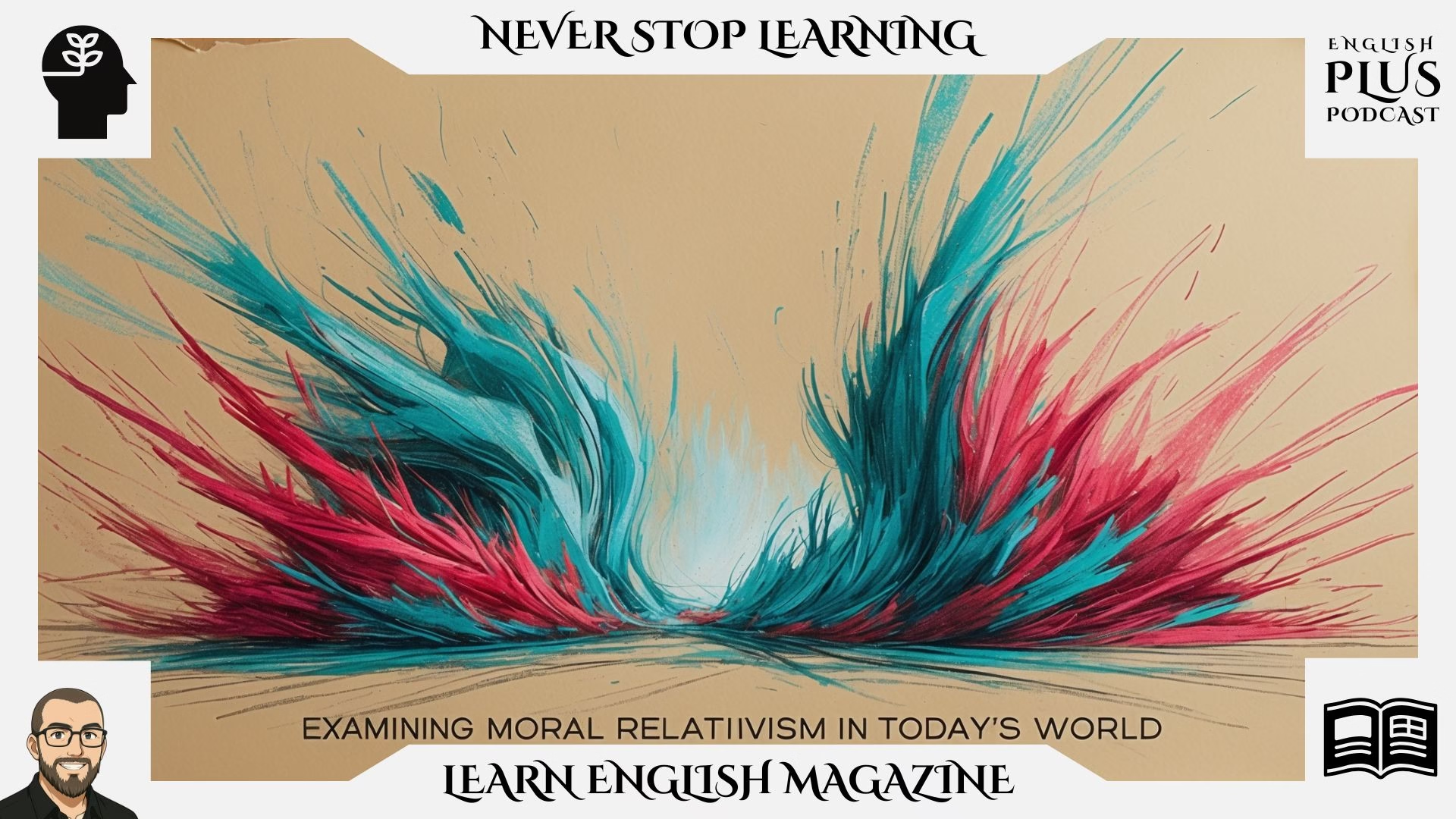Introduction & Listening Tips
Welcome to your listening practice session! Tackling listening sections in international exams can feel challenging, but like any skill, it improves significantly with focused practice. Today, we’ll explore the complex philosophical concept of moral relativism.
To get the most out of this exercise and prepare for your exams, try these strategies:
- Predict Content: Before listening, think about the topic “Moral Relativism.” What ideas or arguments might come up? This primes your brain.
- Listen for the Main Idea: Don’t get bogged down in every single word. Focus on understanding the overall point the speaker is making about moral relativism. What is the central argument or explanation?
- Identify Key Concepts: Pay attention to definitions and distinctions. The speaker will likely contrast moral relativism with other ideas (like moral absolutism). Note these key differences.
- Note Supporting Details and Examples: Speakers often use examples to illustrate abstract concepts. Listen for these, as they often form the basis for specific detail questions.
- Don’t Panic Over Unknown Words: If you miss a word or phrase, keep listening! The overall context might help you understand, or the specific word might not be crucial for answering the questions. Getting stuck on one word can make you miss the next few sentences.
Now, let’s listen to the discussion on moral relativism.
Listening Comprehension
Listening Transcript: Please don’t read before you listen and take the quiz.
Hello everyone. Today, we embark on an exploration into a deeply debated area of philosophy and ethics: moral relativism. In a world characterized by increasing globalization, cultural exchange, and a constant barrage of differing viewpoints via digital media, understanding concepts like moral relativism is more pertinent than ever. It challenges our fundamental assumptions about right and wrong, forcing us to question whether morality is a fixed, universal code or something more fluid and context-dependent.
So, what exactly is moral relativism? At its core, moral relativism is the philosophical position that moral judgments are true or false only relative to some particular standpoint – typically the standpoint of a specific culture or historical period – and that no standpoint is uniquely privileged over all others. Put more simply, it suggests that what is considered morally right or wrong can vary significantly from one society to another, or even from one individual to another, and that there’s no overarching, objective standard by which to judge these differing moral codes.
This stands in stark contrast to moral absolutism, or moral objectivism, which posits that there are universal moral truths that apply to everyone, everywhere, regardless of cultural context or personal belief. Think of prohibitions against murder or theft – a moral absolutist might argue these are inherently wrong, universally. A moral relativist, however, might point to historical or cultural contexts where actions we label as ‘murder’ or ‘theft’ were perceived differently, perhaps as justifiable acts of war, survival necessities, or culturally sanctioned rituals.
Moral relativism often arises from observations of cultural diversity. Anthropologists, for instance, have documented a vast array of moral practices across the globe. Practices considered perfectly acceptable in one culture might be abhorrent in another. Think of differing views on marriage customs, dietary laws, or social hierarchies. Descriptive moral relativism simply observes this diversity – it states as a matter of fact that different cultures have different moral standards. This descriptive claim is generally uncontroversial; the empirical evidence supports it.
The real debate ignites with normative moral relativism. This is the prescriptive view, which argues not just that moral beliefs do differ, but that they should differ, or rather, that we ought not to judge the moral codes of other cultures or societies by the standards of our own. It often promotes tolerance, suggesting that imposing our moral framework onto others is a form of cultural imperialism or ethnocentrism. Proponents argue that this perspective fosters understanding and respect between diverse groups, preventing conflict that might arise from declaring one culture’s morality superior to another’s.
However, moral relativism faces significant criticisms. Perhaps the most potent objection is that it seems to preclude any meaningful moral critique of abhorrent practices. If morality is entirely relative, how can we condemn actions like genocide, slavery, or systemic oppression if they are sanctioned within a particular cultural or political framework? If there’s no objective standard, on what basis can we argue for universal human rights? Critics argue that moral relativism can lead to moral apathy or nihilism, where ‘anything goes’ because no single moral view is better than any other. It potentially undermines the very foundation for social reform or progress, as reformers often appeal to higher, more universal moral principles to challenge existing norms.
Furthermore, critics point out the difficulty in clearly defining ‘culture’ or ‘society’. Within any large group, there are diverse subgroups, dissenters, and evolving moral views. Whose morality counts as ‘the’ culture’s morality? Does the majority view dictate? What about minority rights? If an individual disagrees with their society’s norms, is their moral compass automatically wrong according to relativism? These questions highlight the practical complexities of applying a purely relativistic framework.
Another challenge involves the problem of moral progress. We generally believe that societies can, and sometimes do, improve morally – for instance, by abolishing slavery or granting equal rights. But if morality is purely relative to a specific time and place, the concept of ‘progress’ becomes problematic. How can we say that abolishing slavery was a moral improvement if 18th-century slave-owning morality was just as valid for its time as 21st-century abolitionist morality is for ours? Moral relativism seems to make comparisons across time difficult, just as it does across cultures.
In contemporary discussions, particularly online, we often see a ‘vulgar’ form of relativism expressed as “that’s just your opinion” or “who are you to judge?”. While sometimes used to shut down discussion, it reflects a widespread intuition that imposing one’s views is inappropriate. However, philosophical moral relativism is more nuanced than simply saying all opinions are equal. It’s a specific claim about the nature of moral truth itself.
So, where does this leave us? Examining moral relativism doesn’t necessarily mean accepting it wholesale. It does, however, encourage us to approach moral disagreements with a degree of humility. It pushes us to understand the context behind different moral perspectives and to scrutinize the foundations of our own moral beliefs. Are they based on reason, tradition, emotion, or some combination? Recognizing the diversity of moral practices prompts deeper reflection on whether universal moral principles exist, and if so, how we can identify and justify them. It’s a conversation that continues to shape our understanding of ethics in an interconnected, multifaceted world. The challenge lies in finding a balance – respecting cultural differences while still upholding fundamental ethical principles that protect human dignity and well-being. It requires careful consideration, ongoing dialogue, and a willingness to engage with viewpoints different from our own, even when those viewpoints challenge our most deeply held convictions.
Advanced Vocabulary and Phrases
- Pertinent (adj.): Relevant or applicable to a particular matter. Usage in context: The speaker says understanding moral relativism is “more pertinent than ever” because of globalization and diverse viewpoints, meaning it’s highly relevant now.
- Context-dependent (adj.): Depending on the circumstances or situation. Usage in context: Moral relativism suggests morality might be context-dependent, meaning what’s right or wrong changes based on the specific cultural or historical setting.
- Stark contrast (phrase): A very obvious and clear difference between two things. Usage in context: Moral relativism is described as being in “stark contrast” to moral absolutism, highlighting their opposing views on morality.
- Posits (v.): To suggest or assume something as a fact or basis for argument. Usage in context: Moral absolutism “posits” that universal moral truths exist, meaning it puts forward this idea as a foundational belief.
- Abhorrent (adj.): Inspiring disgust and loathing; repugnant. Usage in context: Practices acceptable in one culture might be considered “abhorrent” in another, meaning deeply offensive or hateful.
- Prescriptive (adj.): Relating to the enforcement of a rule or method; telling people what they should do. Usage in context: Normative moral relativism is called the “prescriptive view” because it argues how we ought to act regarding different moral codes (i.e., not judge them by our own standards).
- Ethnocentrism (n.): Evaluating other cultures according to preconceptions originating in the standards and customs of one’s own culture. Usage in context: Normative relativism is sometimes seen as a way to avoid “ethnocentrism,” which is judging others based solely on your own cultural perspective.
- Preclude (v.): To prevent from happening; make impossible. Usage in context: A major criticism is that relativism seems to “preclude” meaningful moral critique, meaning it makes it impossible or logically difficult to condemn certain actions.
- Apathy (n.): Lack of interest, enthusiasm, or concern. Usage in context: Critics worry relativism could lead to moral “apathy,” a state where people stop caring about moral issues because ‘anything goes’.
- Nuanced (adj.): Characterized by subtle shades of meaning or expression. Usage in context: The speaker notes that philosophical moral relativism is more “nuanced” than simply saying “that’s just your opinion,” meaning it has more subtle and complex aspects.
- Wholesale (adv.): Completely and without reservation. Usage in context: Examining moral relativism doesn’t mean accepting it “wholesale,” implying one can consider its points without fully adopting the entire philosophy.
- Scrutinize (v.): To examine or inspect closely and thoroughly. Usage in context: Relativism encourages us to “scrutinize” the foundations of our own moral beliefs, meaning to examine them carefully and critically.










0 Comments